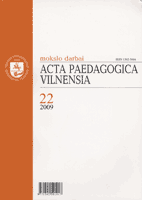PEDAGOGŲ POŽIŪRIS Į MOKYTOJO KOMPETENCIJŲ RAIŠKĄ
EDUCATORS’ ATTITUDE TO THE SPREAD OF TEACHER COMPETENCES
Author(s): Elvyda MartišauskienėSubject(s): Education
Published by: Vilniaus Universiteto Leidykla
Keywords: kompetencija1; požiūris2; kompetencijos struktūra3; mokytojas4; mokinys5;
Summary/Abstract: The importance of competences attached to teacher’s profession is gaining better perception in the context of the 21st century challenges.teacher competences are often associated to learning / teaching achievements, communication, teacher knowledge and teacher personality. Tthese are the highest contours of teacher competences. Eencoding the research data according to categories, they are ranked in the following order: communication, education process, and teacher’s preparedness, personality and achievements. It was observed that communication and achievements are often linked with school learners, whereas personality is related to an educator. The content of categories shows that teachers refer to classical paradigm of education, which is grounded on direct contribution of an educator to school learners’ learning. New education technologies and learners achievements are presented only episodically. Structural generalisation of the research data revealed the fact that teachers include all the elements of competence in the general context; however, only one respondent refers to them all jointly. Tthe research confirms the vitality of competence structure and its reality. In terms of content, the attitudes of teachers are more similar to the conception of competences pre¬sented in the ‘Outline of the national qualifications framework of Lithuania’, where personal, social and ethic competences are distinguished. Teacher competences are often of fragment cha¬racter and reflect the structure of competence in a more general way with insufficient escalation of its content. therefore, education of competences is becoming an urgent problem, whose timely solving may positively affect implementation modern goals of education.
Journal: Acta Paedagogica Vilnensia
- Issue Year: 2009
- Issue No: 22
- Page Range: 88-101
- Page Count: 14
- Language: Lithuanian

